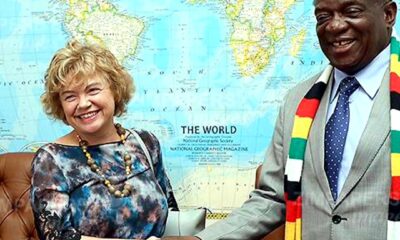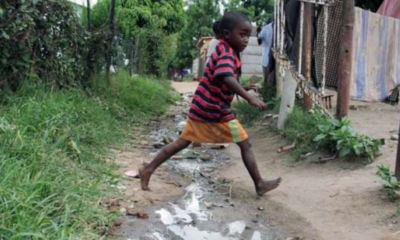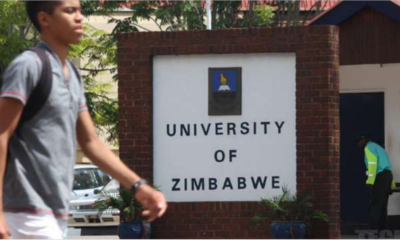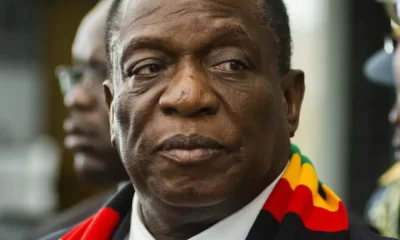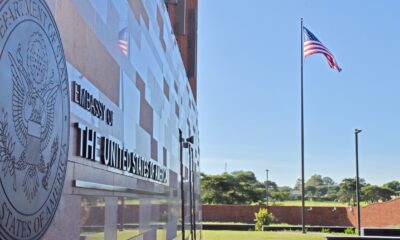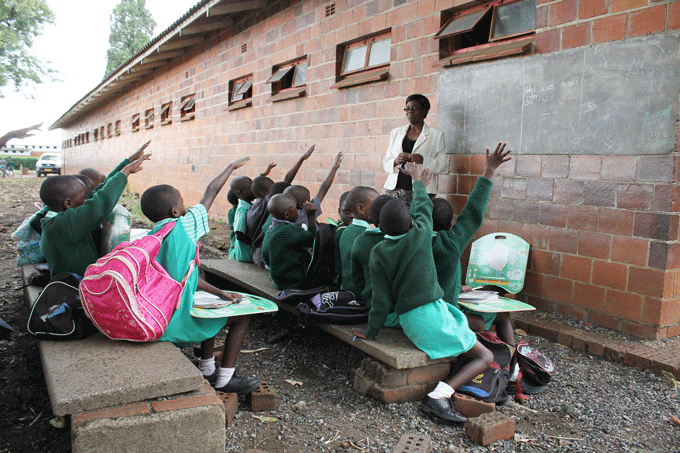
Opinion
Plight of the Zimbabwean teacher
Published
2 years agoon
By
NewsHawksALEX MAGAISA
ON Wednesday, I received a message on social media from a colleague. “When will Magaisa write something about the plight of teachers in Zimbabwe?” read the message.
The colleague was relaying a message from a teacher who described himself as “a teacher who is wallowing in abject poverty”.
It was a sobering moment. It reminded me of our collective shame over how we have habituated to the sorry situation in the public education sector. The poverty that afflicts members of the teaching profession has been normalised. When they go on strike, some people might even think the teachers are the problem, not the victims of a repressive and thoughtless system.
Like many Zimbabweans, I owe my station in life to the tireless efforts of teachers many of whom went well beyond the call of duty to see to our success. I was raised in a family of teachers. The wages that my parents earned were enough to afford us a decent lifestyle. They were able to send us and many other kids to decent schools.
Some of the most influential people in my life were the men and women who took me through the paces at all levels of school education. I remember how Mr Bvumbe at Avondale Junior School in the mid-late 1980s shaped my development in very unfamiliar territory during those formative years.
Mr Mushangwe, my history teacher at Assisi High School, remains a lifelong brother and friend. Mr Chiurayi, our headmaster, was a towering figure who kept us focused. Such was his authority, his mere presence was enough to command the attention of ants.
Mai Chakanyuka was there when I graduated from writing on the floor to earn a place in Group 1 at Kwenda Primary School. There was Mai Madzivanyika’s guiding hand in those formative years.
These were mother figures that showed me the way in those early years. I could write a long list to fill the pages. Suffice to say that each of them played an important role in shaping my life. I am sure everyone reading this has a story or two to tell in honour of teachers that contributed to their development. Yet members of this profession that has done so much for so many have been reduced to penurious lives.
Back then, teachers were revered figures in the community. They commanded respect. Back in the colonial period, when opportunities were few and far between, graduating as a teacher was one of the great achievements for Africans. A mother whose son became a teacher was no longer called by his son’s first name.
Instead, fellow villagers called her Mai Teacher, mother of the teacher. And the teacher’s homestead was referred to as kwaTeacher, his maize field was “munda waTeacher” and his cows were “mombe dzaTeacher”. It was no ordinary status. Young men and women graduating at O Level applied to teacher training colleges. It was a profession to aspire to.
Many of the men and women who went on to lead the struggle for independence started as teachers. Perhaps the most well-known of them was Robert Mugabe, taught by the Jesuits at Kutama before enrolling as a teacher in various parts of the country.
The same profession would later take him to Ghana, where he found love. Zanu’s founding leader Ndabaningi Sithole also trained as a teacher before he joined the clergy. The iconic Herbert Chitepo also began his career as a teacher. Even Abel Muzorewa started as a teacher. One might say that the teaching profession was the seedbed of the struggle for independence. It was from its ranks that the intellectuals of the struggle were born.
A teaching family was able to send their children to some of the best-performing schools that Zimbabwe’s education system could offer. Some of Zimbabwe’s best schools are run by missionaries. They charge fees for boarding facilities.
A lot of students at those schools were from teaching families. They valued education and wanted the best for their children. Many products of this investment are flourishing in various parts of the world. Back then teachers earned enough to send all their kids to such schools while still living a decent life.
As regular wage earners, teachers had access to credit facilities at shops, banks, and building societies. Teaching was a truly middle-class profession that enabled members of the profession to become homeowners in decent residential areas. This is because they earned enough and could save sufficiently to afford a mortgage to buy a home.
In the rural areas, where schools provided accommodation, families were able to build their rural homes, creating insurance for the post-retirement phase of their lives. A teacher could afford to buy a decent vehicle which in rural areas served multiple purposes for the community. Nowadays, many cannot afford the fare for public transport.
Over time, the status of the teacher has diminished significantly as wages have been eroded. Nowadays, teachers are treated with contempt. They are mocked because their earnings are pitiful. The situation of retired teachers is worse. Like other retired civil servants, they are given peanuts in state pensions.
Even those who spent decades making private savings have ended up with very little thanks to a racket of insurance companies pleading with the effects of hyperinflation. The result is that once a respectable profession that permitted families to live decent lives, teachers are now living the life of hunter-gatherers, from hand to mouth.
This week, when schools were due to open after a lengthy pandemic-induced closure, teachers went on strike demanding better wages. It’s a sign of how bad things have become under the
reign of Emmerson Mnangagwa that teachers are benchmarking their demands on what they were earning when Robert Mugabe was in power. Mugabe ruled the country with an iron fist. He was in charge when the country experienced hyperinflation in 2007-08.
Yet when the country dollarized, a teacher was earning an average of US$540 a month. Now a teacher earns just a fraction of that. Inflation and chaotic currency policies have left the teacher earning a pittance.
In response to the strike, the government proposed a 20% wage increase, payment of part of the wages in US dollars, and a set of subsidies on the importation of vehicles and a housing scheme. These proposals have been met with mockery by teachers and observers.
Always ready with a light-hearted take on the government’s lame efforts, Zimbabweans have responded by saying “Promising teachers that they won’t have to pay full taxes on the importation of motor vehicles is like promising women a free beard trim”. They laugh at how the government is mocking teachers by promising something unattainable. It’s promising a tax break on something that a teacher cannot even afford.
A day after the offer, the government issued another notice, suspending without pay for three months all teachers who have “absented themselves from duty since the official opening of schools”. Apart from the fact that this knee-jerk reaction will further paralyze an already stricken public education system, the minister’s action is illegal.
She has no authority to suspend civil servants who are employed by the Public Service Commission, and she cannot suspend employees in such general terms, let alone through a press statement. But this is typical of an intolerant regime whose only language is that of threats and coercion.
That the concerns raised by teachers are legitimate and deserving of serious attention is lost on the regime. It behaves like a man who is armed with a hammer and sees every problem as a nail. For such a character, the only solution is to apply the force of the hammer to the nail. As Obert Masaraure, president of the Amalgamated Rural Teachers’ Union of Zimbabwe said,
“Teachers have been reduced to paupers, they are living in poverty. Teachers can’t even afford to pay school fees in the schools where they ordinarily teach.” The absurdity of this situation where teachers cannot even afford to pay for the education that they are delivering is staggering.
However, although teachers appear helpless, they are not without power. The problem is that they might not realize the power they hold. Striking is one thing but it is by no means the panacea to their long-term problems.
They are in this desperate situation because of deep-seated structural problems that are anchored in an economic architecture that favours the political elites and their associates. Indeed, to isolate teachers from the complex matrix that includes other disempowered groups is to make a grave error. Teachers, nurses, police officers, soldiers, and other civil servants are all part of a system that systematically favours the elites and impoverishes the rest.
The system plays divide and rule, making one part of the public sector feel like it is better placed than the others. Hence, the regime pays soldiers and police officers first, then nurses with the teachers coming last.
When nurses strike, teachers carry on. When teachers strike, nurses carry on. Soldiers and police officers are not legally allowed to strike. Without networks of solidarity, these divided sectors will always be victims of division and rule by those in power. Their power lies in active networks of solidarity.
If they understood their power, they would not let their employer run rings around them as it does. The regime can fire nurses or teachers when they go on strike on different occasions, but it will drive itself into a cul-de-sac if it applies the same repressive methods if all civil servants acted in unison.
It is good to see statements of solidarity with teachers from nurses and the Zimbabwe Congress of Trade Unions. It can be the beginning of a powerful wave that will draw the government to treat civil servants with greater respect than it is doing. If the sectors remain disaggregated and their efforts are sector-based and piecemeal, the regime will continue to have a field day.
More significantly, however, teachers and other civil servants must accept that their problems are systematic and will not be resolved by industrial action alone. Their problems are a symptom of governance weaknesses that pervade Zimbabwe.
There can never be a few islands of sound governance for teachers, nurses, or soldiers, while the rest of society is a sea of bad governance. Zimbabwe’s is a system that needs a systemic overhaul.
Indeed, the same forces that drove the ZCTU to spearhead the formation of the original MDC in 1999 to drive political change have not subsided.
The MDC may have been hijacked by a few reactionary elements who have driven it to the ground, but the Citizens’ Coalition for Change (CCC) represents a vehicle that has the potential to regain momentum and rejuvenate the struggle.
Teachers are the ones that interact with young people in the education system. They are the ones that shape the consciousness of students in their formative stages. Promoting civic engagement and voter registration are some of the things that they ought to promote in their spaces.
And most significantly, teachers are key participants in the election process. They are usually employed as election officials, manning operations at polling stations. For their services, they get an allowance.
Unfortunately, some of them do not look at the bigger picture, that after that moment, they will return to their ordinary lives as teachers on meagre wages, treated with contempt by the regime. By acts of commission or omissions, some of them become enablers of their repression.
But teachers who occupy these roles could use their role as gatekeepers of the election process, ensuring that there is fairness, and that evidence of irregularities is identified and collected, especially in the rural areas.
Zanu PF has had 42 years to improve the condition of teachers. Independence was supposed to be the dawn of a new and brighter era. But a teacher is now worse off than he or she was in 1980, a serious indictment of the post-independence government. The government has failed teachers, and in doing so it has failed the public education system.
A big problem is brewing via the divided education system in Zimbabwe. There has always been a division between the private and public education systems in Zimbabwe, but this gap is widening. The pre-existing division was generally blurred by the fact that the public education system functioned relatively well and produced a good set of results, especially in the church-run schools.
However, the pandemic exposed the great weakness in the public education system. While students in the private education sector had more access to online learning resources, it was different for those in public schools. Those in rural areas suffered the most as schools were closed for long periods impacting pupils’ learning experiences.
Another divide that has emerged is between students writing examinations under the local and foreign examination boards. While students who wrote under foreign examination boards celebrated the release of their results, those under the local board were still writing exams for 2021.
These effects of these divisions may not be apparent in the immediate term, but they will certainly manifest in the long-term impact with the widening gap between the two categories. This is a recipe for more inequality that creates conditions of instability. And now, as teachers in the public education sector go on strike and the system is paralysed, the situation in the private education sector proceeds as normal. But this normal is artificial and unsustainable.
One of the systemic weaknesses is that those in charge of the public education system have no incentive to make it better since they do not use it. Political elites use the private education system.
They are not directly affected by the problems they are causing in the public education system. If they had a vested interest in the public education system, they would pay more attention to the problems and invest more resources to resolve them. They can afford to be nonchalant because they do not suffer the consequences of their decisions.
The irony of the Khupe recall
After news of Thokozani Khupe’s latest recall from Parliament last week, she now has the dubious distinction of being the most recalled MP in Zimbabwe’s parliamentary history. She was recalled in 2018 after Nelson Chamisa took over the leadership of the party. She has been recalled again by Douglas Mwonzora, making her the only person to have been recalled twice in two consecutive parliaments.
Unsurprisingly, Khupe is unhappy about the latest recall. But one cannot avoid noticing that there is more than a huge amount of irony to her complaints. Khupe complains that she has been targeted because she is a woman.
She claims to have written a letter to the UN Secretary-General protesting her alleged mistreatment. But Khupe’s gender discrimination claim is a long shot. She forgets that she got into parliament after a fellow woman had been unjustly recalled.
Her claim to the seat was also dubious because she had competed as a presidential candidate in the 2018 general elections and lost dismally to
the party whose seat she was now occupying. The fact of the matter was the legitimacy of her position in parliament was always weak because of the way the vacancy was created and her occupation of it. Her case is a true definition of the adage that what goes around comes around.
But while Khupe has unclean hands, her case nevertheless provides yet another illustration that the recall provision in its current formulation is not fit for purpose. It is not surprising that the recall provision is being used as a political weapon to settle personal disputes between politicians.
It was originally introduced as a weapon of retaliation. Back in the late 1980S, the maverick politician, Edgar Tekere had fallen out of favour with Mugabe and Zanu PF. But Zanu PF leaders discovered that they could not expel him from parliament after they had fired him from their party. The parliamentary system that Zimbabwe had was built on the Westminster system in Britain, where floor-crossing is permitted.
The recall provision was introduced to plug this “loophole” allowing a political party that the MP was a member of at the election to recall him or her if he or she ceased to be a member of the party. It did not help Zanu PF against Tekere because the new provision could not be used retrospectively.
But it has been a menace in the hands of political parties since then. Both Zanu PF and the MDC parties have used it extensively against individuals who were regarded as having deviated from the party line. In all cases, none of the parties has ever consulted the voters before exercising the power of recall.
The MDC used it in 2002 when it recalled Munyaradzi Gwisai. The MDC also used it in 2014 when it recalled Tendai Biti and others after they formed PDP. It was also used by the MDC against Thokozani Khupe in 2018. Zanu PF has also used the recall provision.
It used it in 2014 when it recalled MPs that were aligned to former Vice President Joice Mujuru’s so-called Gamatox faction. The likes of Didymus Mutasa, Kudakwashe Bhasikiti, and Temba Mliswa were recalled from parliament in that episode. It was also used to recall members of the G40 faction following the coup in November 2017.
It only drew more public attention when it was deployed first by Khupe and later by Mwonzora to recall MPs after the controversial Supreme Court judgment in March 2020. But it had long been used as a political weapon.
The use by Khupe and Mwonzora captured more attention because of the apparent absurdity. In the case of Khupe, it did not make sense to voters how a person who had lost an election could now exercise power to recall MPs who had been elected under her rival’s ticket whereby MPs who had been elected. It also did not make sense why MPs who had been elected under the MDC-Alliance ticket could be removed from parliament by any party other than the MDC-Alliance.
The legal technicality which was exploited was that the recall provision is not based on the identity of the party under which one was elected but the party in which he or she was a member at the time of the election. It was this that made it possible for the MDC-T to claim the right to recall the MPs who had otherwise been elected under the banner of the MDC-Alliance.
One of the defining features of the recall provision is that it is party-centric and ignores the rights and interests of the voters. The voters have no say in the question of recalling the MP. This promotes party dictatorship at the expense of the voters.
A recall has at least two other consequences: first by-elections must be called to fill the constituency vacancies and second, in the case of PR MPs, the party simply nominates replacement MPs.
The problem with by-elections is that it adds another cost to taxpayers. This might not be a problem in the case of one constituency, but where MPs are recalled en masse as has happened in recent years, it is an unnecessary cost to place on taxpayers’ shoulders. This is especially pertinent in a country that is already struggling economically, where scarce resources could be deployed to more productive areas.
The replacement of PR MPs might be cheaper, but it also has serious costs on democracy. The case of Khupe and her allies is a good example of this.
Khupe competed against the MDC Alliance in the 2018 election and lost. In 2020, she took a seat in parliament as a PR MP under the MDC-T, taking the seat of an MP whose party had defeated her. This is because she was now deemed to be the acting president of the MDC-T.
Many of the problems around the recall provision could be minimised if its use by a political party was qualified by the need for citizens’ approval. In other words, there must be a mechanism by which citizens who voted for the MP have a role to play in approving or disapproving of the recall.
The law could set a minimum threshold of eligible voters in a constituency or province that must be satisfied before the recall provision is triggered. If voters agree with the party, the MP will be recalled, but if they disagree, there will be no recall. This would be a more democratic method, but it would also reduce the incentive to abuse the recall provision.
Floor-crossing in Zimbabwe
A final point that needs addressing is the issue of floor-crossing and whether joining another political party leads to the automatic loss of a seat when an MP was elected as a member of another party.
This question might seem odd considering all that has happened in recent years with MPs being recalled because they have allegedly ceased to be members of their sponsoring political parties. But as I argue in this part, readers may be surprised that there is no automatic prohibition of floor-crossing under our law.
Automatic prohibition is where an MP who was elected as a member of one party loses their seat simply by crossing the floor and joining another political party. In such a case, there would be no need for anyone to do anything to cause an MP to lose their seat. Their act of crossing the floor alone would mean a loss of their seat by operation of law.
There is only one circumstance in which this is possible: this is when a person who was elected as an independent MP joins a political party.
I have previously written that this may be called the “Jonathan Moyo clause” because it was essentially a response to what had happened in 2008 when Professor Moyo was elected as an independent candidate before re-joining Zanu PF. The MDC-T felt aggrieved by this because it believed it had had a gentleman’s agreement with Professor Moyo under which it did not field a candidate in his constituency during the 2008 general elections.
What this clause means is that if Temba Mliswa who was elected as an independent in Norton constituency decides to join a political party, he would automatically lose his seat by operation of law. This of course does not stop an independent MP from supporting a political party. That’s why, even as he states his support for Zanu PF, he cannot formally re-join it without losing his seat.
The clause that is often used to claim that floor-crossing is prohibited is section 129(1)(k) of the Constitution. It states that “The seat of a Member of Parliament becomes vacant … (k) if the Member has ceased to belong to the political party of which he or she was a member when elected to Parliament and the political party concerned, by written notice to the Speaker or the President of the Senate, as the case may be, has declared that the Member has ceased to belong to it”.
What this means is that ceasing to belong to a political party is not, on its own, a reason for the law to automatically terminate an MP’s parliamentary tenure. An MP can cease to be a member of the party that sponsored him and still retain his seat if the party does not take positive steps to recall him.
There must be an additional action by the political party to write a notice to Parliament declaring that the MP has ceased to be its member.
The implication of this is that unless the political party has sent a written notice to Parliament, an MP is free to cross the floor. Some might think this is a far-fetched scenario and perhaps an academic argument, but it is not.
When Thokozani Khupe and Douglas Mwnzora began to recall MDC-Alliance MPs, they did not recall everyone. Several MPs who remained in parliament openly declared their allegiances to the MDC-Alliance led by Nelson Chamisa.
Some of them, like Daniel Molokele and Job Sikhala, held senior roles in Chamisa’s party. These people had technically crossed the floor from Mwonzora’s party, but they did not cease to be MPs on that account. Mwonzora had to (and in some cases still must) write to Parliament. That’s why Molokele only ceased to be an MP when Mwonzora eventually sent in his notice to Parliament last week. If crossing the floor was a reason for the automatic loss of a seat, he would have lost his seat long before then.
This matters because there are still several sitting MPs and councillors who swear allegiance to the CCC, not to Mwonzora’s party. They have not lost their seats because they supposedly joined another political party. They are perfectly entitled to retain their seats and to claim allegiance to the CCC until Mwonzora recalls them.
If Mwonzora wants to recall them he will have to take positive steps to do so. Mwonzora will hesitate to recall them in large numbers because he wants to retain the façade that he has numbers in parliament. But since the law does not automatically prohibit floor-crossing these MPs and councillors must be open and clear that they have crossed the floor and they now represent the CCC.
And if Mwonzora does not like it, he will have to axe them and carry the costs of doing so. You should never reduce the opponent’s costs of making bad political decisions. Mwonzora is the one who wants to recall these MPs and councillors and he must bear the political costs of doing so.
About the writer: Dr Alex Magaisa is a law lecturer at Kent University in Britain and former adviser to the late Zimbabwean prime minister Morgan Tsvangirai.
You may like

